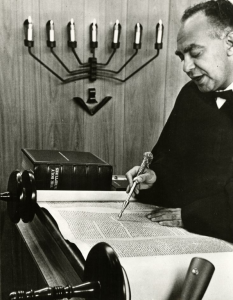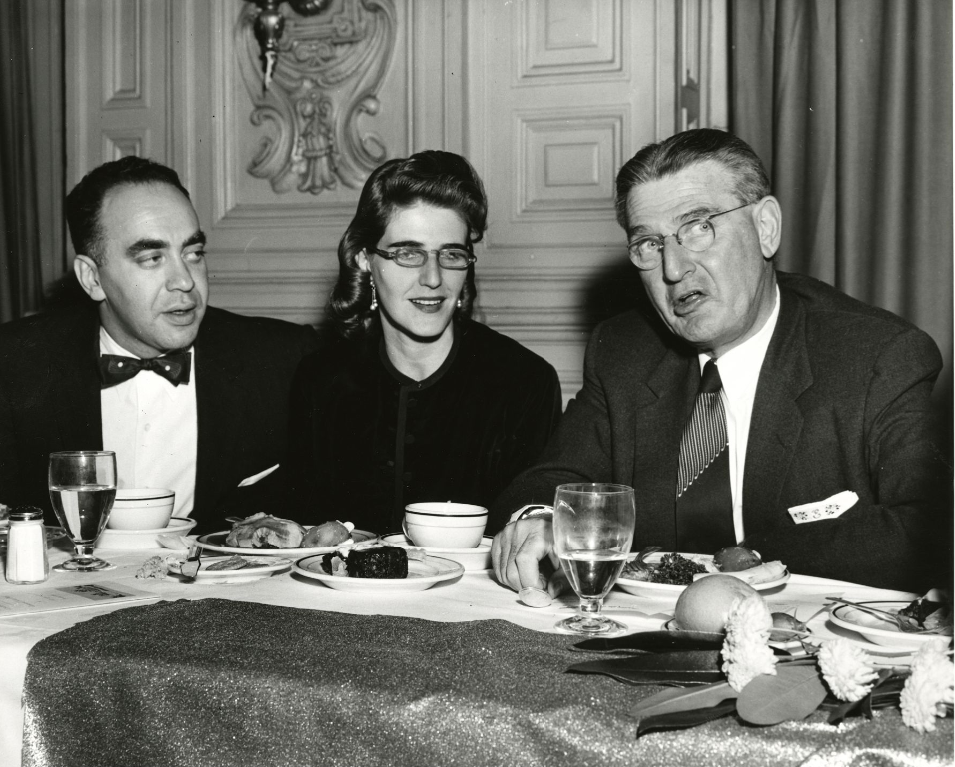
Photo info ...
(Dec. 15, 1920 – Dec. 14, 1993). Rabbi Maurice Davis was an outspoken civil rights activist who used secular and faith-based outlets to advocate for community action against segregation, racist policies, and poverty. He also wrote extensively about the hazards of the ideologies espoused by the alternative religious movements that he dubbed “cults,” and the dangers of their viewpoints to American society.
Davis was born in Providence, Rhode Island, to Yiddish-speaking immigrant parents from Czarist Russia. He attended Brown University and earned his BA from the University of Cincinnati, before earning a Master of Hebrew Letters from Hebrew Union College, where he was ordained as a rabbi in 1949. His early leadership roles included serving as the regional director of the Union of American Hebrew Congregations for the Ohio Valley and Kentucky regions.
Davis married Marion Cronbach Davis, the only daughter of Abraham Cronbach, an Indianapolis rabbi and renowned pacifist, in 1944. The couple moved from Lexington, Kentucky, to Indianapolis, where Davis served as the senior rabbi of the (IHC) from 1956 to 1967. During his time at IHC, Davis continued to advance the progressiveness of Reform Judaism his predecessors at IHC started. He was instrumental in the construction of the congregation’s current temple building, which was erected on Meridian Street in 1958.

Davis’s passion for human rights causes was evident through his service as president of the Indianapolis Council on Human Relations, his work on the Mayor’s Commission on Human Rights, and his leadership in the city’s Housing Commission. Davis also helped sell the former IHC temple building to the now-infamous religious leader and his Peoples Temple. Although Jones was initially seen as a progressive leader, his later actions in California and Guyana would lead to tragic consequences for his followers.
Davis’s commitment to civil rights was unwavering. He maintained a close relationship with Abraham Joshua Heschel, a rabbi and fellow civil rights advocate whom he had first met in the 1940s, when both were rabbinical students at Hebrew Union College. In 1965, Davis marched from Selma to Montgomery, Alabama, alongside Martin Luther King Jr. and Heschel. His courage in fighting for racial equality made him a target of hatred. His family received death threats, and their home in Indianapolis faced bomb scares; nevertheless, he remained steadfast in his mission.
In 1967, Davis left Indianapolis to become the senior rabbi of the Jewish Community Center in White Plains, New York. In his new city, he remained active in Jewish organizational life, leading the Westchester Board of Rabbis. In the 1970s, Davis focused on combating the influence of destructive alternative religious movements that he deemed “cults.” He founded Citizens Engaged in Reuniting Families (CERF) in 1972 and claimed to have personally helped extricate 187 young people from such organizations. Davis was also a longtime columnist for Indiana’s until his death in 1993. Davis left a lasting impact both in Indianapolis and nationally, particularly through his commitment to the civil rights movement and his later efforts to protect youth from harmful influences.
FURTHER READING
- Davis, Maurice, Rabbi. “Lincoln and Liberty” (sermon, Indianapolis Hebrew Congregation, Indianapolis, IN, February 12, 1960). https://images.indianahistory.org/digital/collection/p16797coll18/id/4110/rec/9.
- Davis, Maurice, Rabbi. “Not Again!” (sermon, Indianapolis Hebrew Congregation, Indianapolis, IN, January 22, 1960). https://images.indianahistory.org/digital/collection/p16797coll18/id/4101/rec/8.
- Davis, Maurice, Rabbi. “Purim For Grown-Ups” (sermon, Indianapolis Hebrew Congregation, Indianapolis, IN, March 11, 1960). https://images.indianahistory.org/digital/collection/p16797coll18/id/4119/rec/10.
- Gugin, Linda C., and James E. St. Clair. Indiana’s 200: The People Who Shaped the Hoosier State. Indiana Historical Society Press, 2016. https://search.worldcat.org/en/title/907810772.
- Simins, Jill Weiss. “Walking with Dr. King: The Civil Rights Legacy of Rabbi Maurice Davis.” Untold Indiana, January 9, 2019. https://blog.history.in.gov/walking-with-dr-king-the-civil-rights-legacy-of-rabbi-maurice-davis/.
CITE THIS ENTRY
APA:
Brown, M. (2025). Maurice Davis. Encyclopedia of Indianapolis. Retrieved Mar 3, 2026, from https://indyencyclopedia.org/maurice-davis/.
MLA:
Brown, Michael J. “Maurice Davis.” Encyclopedia of Indianapolis, 2025, https://indyencyclopedia.org/maurice-davis/. Accessed 3 Mar 2026.
Chicago:
Brown, Michael J. “Maurice Davis.” Encyclopedia of Indianapolis, 2025. Accessed Mar 3, 2026. https://indyencyclopedia.org/maurice-davis/.

Help improve this entry
Contribute information, offer corrections, suggest images.
You can also recommend new entries related to this topic.